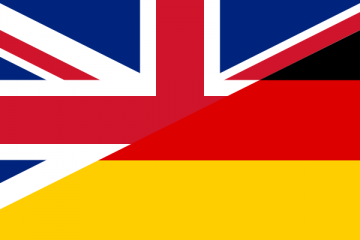
You can speak good German but sometimes, simple words or phrases used by natives can stump you. All this happens because the “real language” differs a lot from the “textbook language”.
Conversational Greetings in German
We all know the common greeting in German- Guten Morgen! Guten Tag! Guten Abend! However, you will hear conversational Hallo! in the north of Germany and Servus! Grüss Gott!- in the south of Germany.
Moin! is a short form of the word “Morgen” (morning) but can be used as a greeting at any time of the day.
Was geht ab? means a common question «Wie geht es?» («How are you?»). To answer this question, young people usually say: «nicht viel» (just the usual) or «alles gut» (fine).
Es geht bei mir immer los means “ There is always something happening to me” or “I have so much going on”.
To greet someone, you can use the question “How are you?” and make it with the help of particle “Na”.
Na, alles klar? – Ja und bei Dir? – Are you ok?- Yes, and you?
Na, Du?- Hi, how is it going?
Ways to say goodbye in conversational German
To say “bye” in conversational German, we use Tschüss (bye!) or Auf Wiedersehen (goodbye!)
Tschüssie (Пока!) is used between good friends
Mach’s gut / Mach es gut is often used to say bye to a friend. It's something like «Take care» or «Good luck» .
Ciao («Чао» - прощай) is entrenched in spoken German as well.
The most popular slang
Cool comes from English. It has the same meaning as in English.
Geil is a German way to say “cool”. It has the same translation.
Super / mega / ultra are the prefixes to enhance the meaning. The German youth
often use them instead of the word “sehr” (very). The words «very good», «excellent», «perfect» and «great» have synonyms, and they became very popular lately. They are – «Super» (hoch besser als sehr schön, sehr gut), «Prima», «Klasse», «Toll», «Geil» (sehr gut), «Megageil» (sehr sehr gut), «Cool» (besonders gut), «Irre» (besonders gut).
Krass is a German reaction to any surprising, unexpected or even shocking story. This word is somehow similar to "That's gross!"
Halt («kind of» or «like») is used in speech but doesn`t add any meaning.
So ein Quatsch («foolishness, nonsense»). The verb quatschen means “to chat”. Its synonym in a literary language is sprechen “to talk”.
Nix is a spoken variant of the word “nicht” (no).
Dingsbums. Sometimes, you find yourself unable to think of a word you know. In such case, the Germans say Dingsbums. In English it reminds of «whatdoyoucallit» or «how to put it».
Blöd («stupid, foolish»).
Verdammt is used to express indignation, resentment. It means “damned”. In the sentence, it acts as an adverb or an adjective.
The most popular slang phrases
Bock haben expresses the desire to do something. The synonym of this expression in the literary language is «Lust haben».
Die Nase voll haben means literally “to have a stuck nose”. In fact, this phrase expresses the feeling of not being satisfied with the situation you are in. You say that you are fed up with everything.
Du gehst mir auf den Keks! means you are getting on my nerves. The literary equivalent of this phrase will be «Du gehst mir auf die Nerven».
Hast du ein bisschen Kohle für mich? – «Do you have some dough (money) for me?» «Die Kohle» literally means «coal». The literary equivalent of this phrase is «Hast du ein bisschen Geld für mich?».
Es ist mir egal – «I don`t care», «It really doesn`t matter to me».
Das Wetter ist heute total beschissen. – «The weather today is nasty». The literary equivalent is «Das Wetter ist sehr schlecht».
Lasst euch es gut schmecken! – «Have a good meal!» The literal German is Guten Appetit!
In this article, we presented the most popular words and phrases in spoken German. The slang is now used in politics and art alike. You don`t need to go far to see examples where the slang is used. Almost every German movie has these slang phrases. You can hear them at the rostrums, in newspapers, on TV.
At the lessons from Skype-Language.com, you can learn more spoken German phrases. It will help you to fit into Germany without feeling like a stranger! Sign up for a trial today! We wish you achieve your academic goal!

























